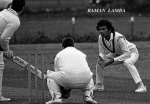SJS said:
I tried every possible way to see your 'subjective criteria' and have come to the conclusion that only , and absolutely only, if you consider total career runs scored in ODI's by a batsman, can Richards be kept below the five batsmen you chose !!

Bingo!
I found it to be the only real critera I could use. 'Subjectively' my top five would have been
1) - Tendulkar
2) - Dean Jones
3) - Bevan
4) - Lara
5) - Ganguly
...again no Richards....sorry!
However, a top ten would be
1) - Sachin Tendulkar
2) - Dean Jones
3) - Michael Bevan
4) - Brian Lara
5) - Surav Ganguly
6) - Viv Richards
7) - Saeed Anwar
8) - Aravinda da Silva
9) - Ricky Ponting
10) - Jacques Kallis (don't laugh, 203 games 7268 @ 46.00)
However greatness must be recognised:
2 days to go...
That one stroke said all. As he went inside the line of a Mike Hendrick delivery and flicked it over square-leg for a six in the 1979 final, Viv Richards was making a statement: he could do what he wanted, the bowler did not matter and the situation was immaterial.
That Hendrick delivery was the last ball of the innings. And the incomparable Richards (138 not out, 157b, 11x4, 3x6) had just helped the West Indies recover from the depths of 99 for four to an imposing 286 for nine, playing the role of a sheet anchor with admirable poise and confidence while nursing Collis King (86), who showed that he too could be destructive when in the mood.
The epithet `King' has always been applied to Richards, and not for nothing has he been chosen one of the five `greatest cricketers of the 20th century.'
Richards was possibly the only batsman who intimidated bowlers just by walking out to the crease. Generally, it is the quick bowlers who intimidate batsmen. But ask the bowlers of his time the world over — the Englishmen especially — and they'll confess Richards always played on their minds.
Richards made an impact on the inaugural World Cup of 1975 with his panther-like fielding in the final against Australia. He turned the contest in favour of the Caribbeans with his well-directed missiles to run out opener Alan Turner and the Chappell brothers, Ian and Greg. This, after he had come of age as an international batsman on the '74-75 tour of India, which made him a natural choice for the '75 edition.
By the '79 World Cup, Richards had built a reputation of being the most attacking batsman in the game. Playing alongside the might of Gordon Greenidge, Des Haynes, Clive Lloyd and Alvin Kallicharan helped, as it saw Richards bat with the freedom few enjoyed.
It was Richards' exit that opened the floodgates for the Indians in the 1983 final. Chasing 184 for victory, Richards, walking in at No. 3, went about his business in characteristic style, so much so that his 33 contained seven boundaries, before Kapil brought off an astounding catch.
Though the defeat disturbed Richards, his biggest disappointment was that the side he led in the 1987 edition, staged in the sub-continent, failed to avenge the '83 loss. But then, it was a rather inexperienced team that he was handling. Michael Holding had announced his retirement earlier while Greenidge and Malcolm Marshall didn't make the trip. But Richards' magnificent 181 against Sri Lanka in that tournament is etched in memory.
Only two other batsmen have made centuries in a World Cup final: Clive Lloyd in '75 and Sri Lankan Aravinda de Silva in the 1996 edition. Lloyd and de Silva were backfoot players; Richards, however, was basically a frontfoot player. And the comparisons end there. Richards was Richards. The King. —
This article was written before Pontings magnificant effort during the 03 World Cup Final.




